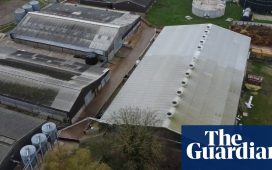Councils in England are to be encouraged to sell publicly owned buildings and other assets worth up to £23bn under plans being explored by ministers to plug budget shortfalls amid the crisis in local government.
Under plans being examined by Michael Gove’s Department for Levelling Up, Housing and Communities, councils would be given greater flexibility to use money raised from asset disposals to meet their budget pressures.
In a consultation with town hall bosses closing on Wednesday, ministers estimate councils have “investment properties” worth £23.2bn which could be disposed of to help meet budget shortfalls with proposed changes to the rules that would allow sales without government approval.
The government said its aim was to encourage the sale of assets held only for revenue, and not buildings or places used for the “delivering of the objectives of the local authority”.
However, critics warned of a “fire sale” of public assets amid the multibillion-pound funding shortfall for local authorities across the country.
Rob Whiteman, the chief executive of the Chartered Institute of Public Finance and Accounting, said he welcomed councils being handed greater flexibility, but warned it was a “sticking plaster” solution because it would not address longer-term pressures on their finances.
“We’re in a short-term, last-chance saloon place where councils won’t go bust, but in no way does it offer a medium-term solution,” he said.
“The truth is councils are being incentivised to dispose of assets to use those capital resources to fund their revenue budgets, which is appalling. They need to be properly funded by taxation.
“You would not recommend to any other country in the world to fund their public finances this way. It’s a sort of directive to break the rules – an allowance given to break all known usual accounting convention.”
Dozens of councils have already earmarked libraries, civic halls, swimming pools and community centres for sale to raise hundreds of millions of pounds, including in Leeds, Kent, Somerset and Woking.
However, property experts warned the moment to sell could hardly be worse amid a slump in the market driven by near-stagnant growth in the UK economy and higher borrowing costs from the Bank of England.
“If you were trying to identify the worst moment to sell, the first half of 2024 would probably be it,” said Mat Oakley, head of UK and European commercial property research at the leading estate agent Savills.
“A potential buyer will say: ‘They have to sell this, how little can I get away with paying them for it?’ I wouldn’t advise anyone to sell now just because there is that hint of blood in the water.”
Handing councils greater flexibility could, however, help some local authorities to unwind risky investments made using billions of pounds in taxpayer-funded borrowing. Councils including Woking, Thurrock, and Warrington have ploughed vast sums into assets ranging from skyscrapers and shopping centres to solar farms and stadiums.
However, many assets bought in recent years are likely to be worth less than councils paid for them. Figures from Capital Economics show capital values have dropped by about 20% since mid-2022, with offices recording a fall of 23%.
There are worries that much-loved community buildings will also be listed for sale. Analysis by the IPPR thinktank last year found 75,000 public assets, worth about £15bn, had been sold by English councils since 2010, in part to plug holes in their budgets.
Zoë Billingham, director of IPPR North, said: “It’s one-off capital receipt to fund ongoing revenue pressures, which will last for as long as they have buildings to sell. I don’t think that’s a good thing. It’s not a fix.
“It’s also a one-way street. Once public assets have been sold, I would be shocked to hear at a future date any council or government will buy them back. It’s a temporary fix for a difficult time. It’s not sustainable.”
The government has been approached for comment.









